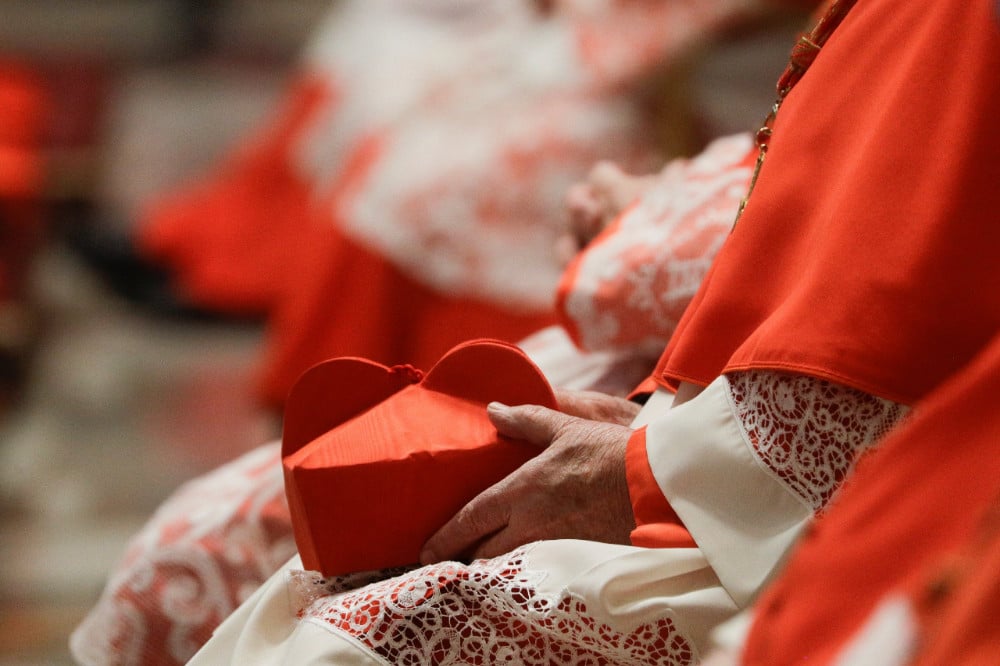The first thing people who work in Catholic ministries that assist women with crisis pregnancies want people to know is that they were doing the work long before the U.S. Supreme Court’s June 24 decision in Dobbs v. Jackson Women’s Health Organization overturned the idea that there is a constitutional right to abortion in the United States.
Many, in fact, stood ready to help mothers and their children before the Roe v. Wade decision in 1973, and they are ready to help now. Even if they are challenged to find more resources because more women need their services, they said, that’s a good thing.
They do the work because they believe in the sanctity of life and they are committed to following Jesus’ commandment to love their neighbors.
But, providers say, they understand that those services might be more in demand, especially in states where the overturning of Roe V. Wade led to rapid imposition of more restrictions on abortion, meaning more women will likely carry their pregnancies to term.
“In my mind, it will increase the need,” said Cindi Kopel, director of maternal and family programs for Catholic Charities of Southern Missouri. “I hope it increases the need.”

Missouri legislators passed a “trigger law” in 2019 that banned nearly all abortions in the state as soon as the Supreme Court overturned Roe v. Wade.
Kopel’s agency operates LifeHouse, a transitional residence for up to 18 homeless pregnant women in Springfield, Missouri, which offers wraparound services to help them become independent by the time their babies are a year old, and a community-based program for mothers who have a place to live but are at risk, Kopel said. The agency is also in the midst of a capital campaign to open a second LifeHouse in Cape Girardeau, Missouri, because community members asked for one.
As of July 2022, 113 babies had been born to women at LifeHouse since it opened in 2013, Kopel said, and many more women have been helped there, even if they decided not to stay until their babies were delivered.
Women who come to LifeHouse are homeless, and many do not have high school diplomas or driver’s licenses, she said. Some of them arrive with an older child; mothers can bring one child up to four years old with them. They do have to be sober for at least 30 days before they move in; often, they are looking for a place that will support their sobriety.
When they arrive, staff give them some time to adjust.
“We say they need a week to sleep, to feel safe and to eat,” she said.
Then staff members help them make a plan. For one woman, now in the two-year aftercare program, that included getting a driver’s license and a GED before her baby was born, then helping her get a car so she could drive her children to day care and herself to work.
“When she got that first car, she was so proud,” Kopel said.
 “They need to know that there is someone there to walk alongside them in this journey. … They often come in and describe themselves as broken. I have heard that from probably 80% of the women who come. To see them smile and be able to build relationships with the other women here and develop friendships — I’m so proud of them.” “They need to know that there is someone there to walk alongside them in this journey. … They often come in and describe themselves as broken. I have heard that from probably 80% of the women who come. To see them smile and be able to build relationships with the other women here and develop friendships — I’m so proud of them.”
–Cindi Kopel |
When that woman moved out a year after her baby was born, she moved into her own one-bedroom apartment — the first place she could ever remember having as a permanent home, Kopel said. Now she has been reunited with another older child who had been staying with relatives, and she is working full-time and just bought herself a newer car.
The Healthy Moms/Healthy Babies program, also run by Catholic Charities of Southern Missouri, offers services to pregnant women who are in their own homes. It has had up to 55 women enrolled at a time from the Diocese of Springfield-Cape Girardeau’s 39-county service area, and it provides counseling, parenting education and connections to services and other help provided by Catholic Charities and other community-based organizations, Kopel said.
Both programs have a Dedicated Dads component for men who are involved in their partners’ lives, offering support, parenting education and, often, financial counseling.
“We’ll help them with things like making a budget,” she said.
What mothers facing a crisis pregnancy most need, Kopel said, is a feeling of hope, and a feeling that they are not alone.
“They need to know that there is someone there to walk alongside them in this journey,” she said. “We’re going to find out what their goals are. What do you want to see in your life, and what do you want for your child? Many of these women have never had a job, they’ve never driven. … They often come in and describe themselves as broken. I have heard that from probably 80% of the women who come. To see them smile and be able to build relationships with the other women here and develop friendships — I’m so proud of them.”
Kopel said that nearly all the women who come to LifeHouse or participate in Healthy Moms/Healthy Babies plan to parent their children, but a few have placed them for adoption. When a mother wants to do that, Catholic Charities will help them make plans, including helping them find a reputable adoption agency to work with.
Adoption and foster care
Sandra Fay, the adoption program director for Catholic Charities of the Diocese of Cleveland, Ohio, said she hopes that more pregnant women choose to place their babies for adoption if they aren’t able to parent them.
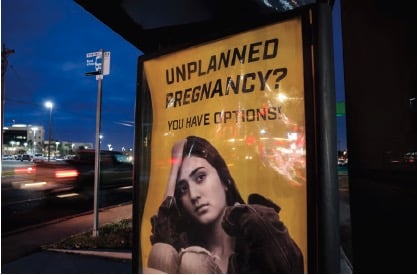
women. CNS photo/Evelyn Hockstein, Reuters
Fay and Jennifer Smith, who directs the agency’s foster care program, are working to get the word out in parishes and in the wider Cleveland community about the services they provide in hopes that more people will both take advantage of them and volunteer to help.
The Ohio legislature passed what’s known as a “heartbeat bill,” or a ban on abortions after cardiac electric activity is detected at about six weeks of gestation, in 2019. That bill was blocked from going into effect while various challenges to Roe v. Wade were mounted; the injunction was dropped and the law went into effect hours after the Dobbs decision was released.
According to the Ohio Department of Public Health, more than 20,000 abortions were performed in Ohio in 2020.
Meanwhile, Fay keeps a waiting list of 20-30 families who want to adopt a baby, she said, and receives inquiries from more families almost every day. She won’t let the waiting list get too long because she doesn’t want to keep families in limbo for years.
That’s because the agency has been averaging about four or five adoptions a year, down from about 200 a year in the decades before abortion became legal. The agency has been coordinating adoptions for more than a century.
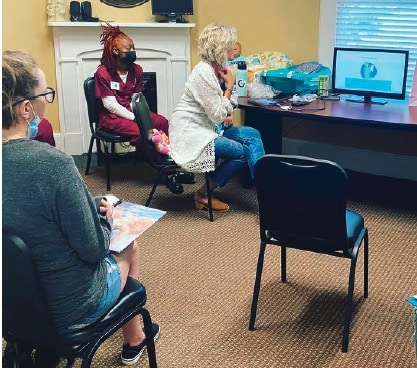
The agency works with birth mothers considering adoption throughout their pregnancies, offering counseling and other services to help them make the best decision they can. In nearly all cases now, adoptions are open, meaning the birth mother and the adoptive family have some level of contact, depending on what they choose.
“That’s pretty much standard in adoptions now,” she said.
Sometimes, the birth mothers decide not to pursue adoption, Fay said, and that’s fine, even if that decision comes at the last minute.
“Sometimes mothers have every intention of adoption through seven months of counseling, and then at the end they decide not to go through with it,” she said. In those cases, the mothers are connected to services to help them parent.
“We have over 60 services that we provide, and there are county services as well,” Fay said. “We assist the best we can with people finding solutions in their situations.”
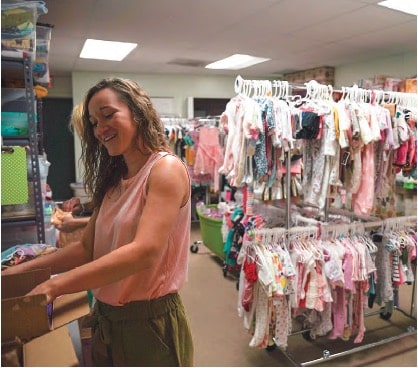
Detroit Catholic
Smith said foster care comes into play when there has been a failure that led to state officials removing children from their homes for their safety. Children are placed in licensed foster homes, in most cases, until their parents are able to take them back, although some of them go on to be adopted if it’s determined that their parents will not be able to provide a safe, nurturing environment.
Catholic Charities contracts with the public agency that takes custody of children in unsafe situations, Smith said, and gets about 200 referrals a year. From that, roughly 15 children are placed in one of the 30 licensed foster homes that work with the agency.
While there are open beds for foster children at the moment, Smith said she would like to recruit more foster families now in case of increased needs in the future. It takes about six months, give or take, for a family to be licensed to provide foster care in Ohio, she said.
“We’re trying to get our information out there,” Smith said.
| Pope Francis’ advice to future mothers |
|---|
 “With great affection I urge all future mothers: keep happy and let nothing rob you of the interior joy of motherhood. Your child deserves your happiness. Don’t let fears, worries, other people’s comments or problems lessen your joy at being God’s means of bringing a new life to the world. “Prepare yourself for the birth of your child, but without obsessing, and join in Mary’s song of joy: ‘My soul proclaims the greatness of the Lord and my spirit exults in God my Savior, for he has looked with favor on the lowliness of his servant’ (Lk 1:46-48). Try to experience this serene excitement amid all your many concerns, and ask the Lord to preserve your joy, so that you can pass it on to your child.” — Pope Francis, Amoris Laetitia, No. 171 |
Getting families on their feet
The Catholic Social Services of the Diocese of Rapid City, South Dakota, also connects women who want to place their babies for adoption with families eager to raise them through Trinity Pregnancy and Adoption, which offers counseling to pregnant women whether they are planning to parent their babies or place them with adoptive families.
Almost all abortions became illegal in South Dakota on June 24 under a trigger law passed in 2005. The law, whose only exception is to preserve the life of the mother, makes performing an abortion, including administering drugs intended to abort a pregnancy, a Class 6 felony.
But Jim Kinyon, executive director Catholic Social Services of the Diocese of Rapid City, said it’s more important to focus on the support that agencies such as his can provide to mothers who are struggling to raise their children.
“It’s not enough to be anti-abortion,” Kinyon said. “If we’re going to be pro-life, it is critical that we recognize that the needs of these families are very real.”
One example, he said, is the Uplifting Parents program that was funded by an unsolicited donation to Catholic Social Services in 2014. The program provides single mothers who are within two years of finishing a degree with mentorship and a $250 monthly stipend.
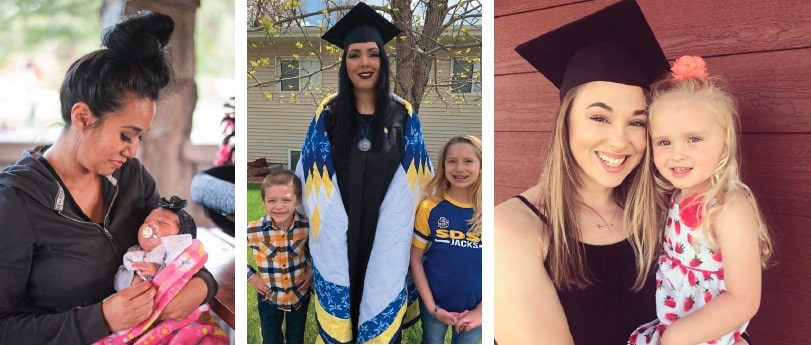
About 80% of participants end up graduating within the two years, Kinyon said. This year, 15 women with a total of 34 children graduated, and all of them either have jobs or are seeking further education.
Many go into education or health care, Kinyon said.
“Of the 15 that graduated, we have five nurses,” he said. “Do you know how badly our community needs nurses today?”
The program has been so successful that Kinyon would like to do something similar for women seeking certifications rather than degrees, offering help to those studying building trades like plumbers and electricians or those seeking jobs as licensed practical nurses or emergency medical technicians.
“Let’s face it, a $250 stipend is a drop in a bucket, but it helps,” Kinyon said. Then, when the women earn enough to be self-sufficient, “the state wins, the government wins, the taxpayers win, the families win, the employers win. They know how hard it is to go to school full-time and to be a parent. These women are winners. These are the kind of employees anyone would want to hire.”
Kinyon said that the community has to come together to support families, especially those headed by single women, just as his family was supported after his father died when he was a young boy.
“I grew up in a single-parent household,” he said. “If I do half the job that my mom did with half the support I have, I’ll be a success.”
His mother, he said, was a hero for what she did keeping the family together, but she couldn’t have done it without help from friends, neighbors and her parish.
The women in the Uplifting Parents want to do the same thing for their families, he said, and the community — including the local church community — needs to show that it values them and their efforts.
“They aren’t a bucket of needs,” Kinyon said. “These are people with talents and skills that our communities need. And they want to share those talents and skills with the community, and they want to provide for their families. Being pregnant shouldn’t change that.”
The gift that started Uplifting Families was a half-million dollars, Kinyon said, and eight years and many, many success stories later, the agency hasn’t even used half of it. The donor’s gift has multiplied many times.
“People do respond to the love of Christ in their lives, and they look for ways to be that in the world,” he said. “The dynamic love that he [the donor] unleashed is what we need to unleash as this goes forward. We’ve got a tremendous opportunity to be the love of Christ for our brothers and sisters.”
All of that work is part of the Church’s commitment to honoring the gift of life, said Kinyon, who is also working with his Knights of Columbus council to raise money for “welcome packets” of gifts for every baby born in local hospitals.
“We need to emphasize that no matter who you are, no matter what faith you are, we do care about you and we care about your baby,” Kinyon said. “It isn’t that we’ve just been fighting against abortion. We’re standing for the sacredness of human life. Every human being. … We are supposed to be the love that Christ is for us in the world. I’m confident that in many ways, we will step up. We can do better, and we will do better.”
Michelle Martin writes from Illinois.
| Walking with moms in need |
|---|
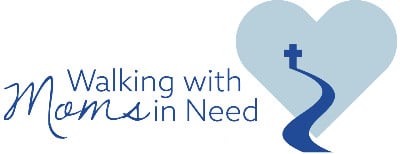 In early 2020, the U.S. bishops launched Walking with Moms in Need, a process through which Catholic parishes and communities can support local pregnant and parenting women in need. While it was largely put on hold due to the COVID-19 pandemic, the initiative is now gaining steam in dioceses and parishes across the country, especially following the Supreme Court’s June 24 decision that overturned Roe v. Wade. In early 2020, the U.S. bishops launched Walking with Moms in Need, a process through which Catholic parishes and communities can support local pregnant and parenting women in need. While it was largely put on hold due to the COVID-19 pandemic, the initiative is now gaining steam in dioceses and parishes across the country, especially following the Supreme Court’s June 24 decision that overturned Roe v. Wade.
The U.S. Conference of Catholic Bishops called Catholics to “walk in the shoes” of local mothers in need. That means offering direct assistance or cataloging and directing them to services to help them through pregnancy and into their child’s toddler years. “The COVID shutdown slowed the effort, but we are coming back strong out of that,” Therese Stahl, director of Life and Family Evangelization for the Diocese of Rockford, Illinois, told Our Sunday Visitor in early June. “We are encouraging parishes to participate.” That means each parish in the country should gather and distribute detailed lists of every service available to mothers in need in their area. Read more about this initiative at OurSundayVisitor.com, and visit Walking with Moms in Need website for more resources on how parishes and dioceses can help mothers in need, as well as to stay up to date with the program. |







